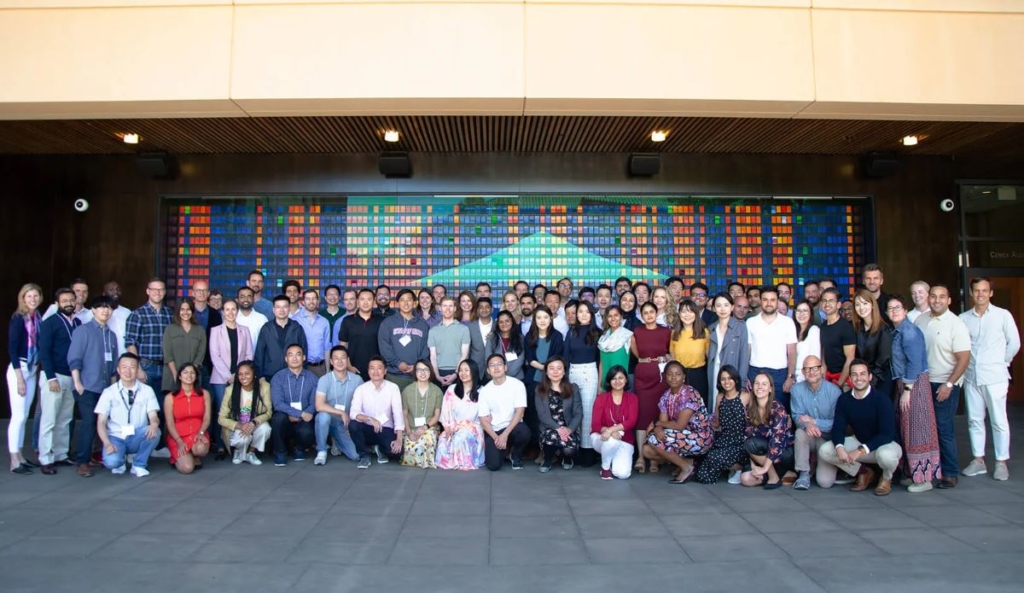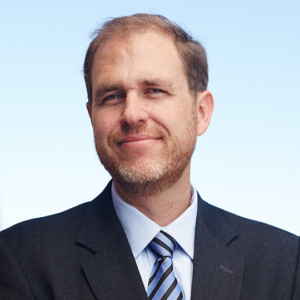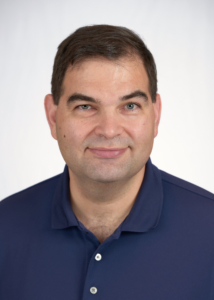
Stanford’s MSx Class of 2023 pose in front of the Knight Management Center at the start of their first quarter in July. Stanford photo by Julia Yu
As a relatively young infectious disease specialist in Slovenia, Federico Potočnik, MD, was called to the frontlines when a new and little understood virus began sweeping through his hospital in early 2020. He and his colleagues knew doctors were dying in China, that the virus was killing patients in their 60s and 70s who were otherwise relatively healthy, and that younger doctors had a greater chance of surviving exposure than their older colleagues. Potočnik and others stepped up to care for patients filling up the ICUs.
“There was ongoing anxiety in the hospital and the system in general, but it had to be done. So we dug in,” Potočnik, 34, tells Poets&Quants.
“In our specialty, we’re used to seeing elderly people in bad conditions dying. Or people with dementia who are not fully aware of their surroundings. But with COVID, we saw them die more often and in different conditions. These were younger and people who could have conversations like this one we’re having right now. To see those people aware of their own end, it was quite a challenge for us. Everyone got burned out in those two years. It was a very difficult time.”
By the middle of the pandemic, Potočnik realized that many of the persistent problems facing his hospital and the medical response in general were happening because of mismanagement in the medical system. So often, doctors become CEOs of hospitals or large systems despite having no managerial experience.
He decided to pursue management training while serving on a hospital board that was hiring a new general director. The top candidate’s medical credentials were top notch, but he had little managerial experience. The candidate said he was reading management books to prepare.
“That was the pivotal moment. We need MD/MBAs which, in Europe, are not as common in the U.S. I decided to go to a program that would give me the insights to be able to manage a large system like a hospital or a ministry.”
INTRODUCING STANFORD’S MSx CLASS OF 2023
Potočnik is one of 84 students in Stanford Graduate School of Business’ MSx Class of 2023. Created in 1960 with support from the Alfred P. Sloan Foundation, it was formerly called the Stanford Sloan Program, but changed the name in 2013. (Its students are still often referred to as Sloan Fellows.)
Stanford’s MSx is one of three elite, one-year intensive, mid-career management programs in the world created through the Sloan framework and funding. MIT Sloan School of Management and London Business School also offer their versions of the Sloan Fellowship.

Mike Hochleutner
Stanford’s fellows began the full-time, one-year accelerated masters on July 5, while campus was still relatively empty through the summer break. They have an average of 13 year of work experience, ranging between 8 and 30 years across dozens of industries and from 37 different countries, according to the class profile released today (August 31). Sixty eight percent of them come from outside the U.S., and more than half of the U.S. students also identify as people of color.
While mid-career programs typically see less women than other management programs, 37% of the MSx program are female, including 12 who are mothers. More than two-thirds have partners, and 35 class members have 63 children between them, ranging in age from newborn to 24 years.
“We were very impressed with the caliber of applicants this year, and the result is an exceptional class,” said Mike Hochleutner, director of Stanford GSB MSx admissions. “As industries struggled to adapt to disruptive changes since 2020, opportunities arose for some to step up in remarkable ways as leaders. We sought those individuals.”
THE MD WHO WANTS TO UPSKILL
Potočnik was born in Argentina and moved to Slovenia, the country of his grandparents, at 14. In high school, he wanted to study both medicine or international relations, but realized he’d never get the chance to treat patients with the latter while medicine would allow him latitude to pursue more diplomatic pursuits if he chose. Throughout his medical training, he stayed active in several political organizations, rising to International Secretary for Nova Slovenija – Krščanski demokrati, a member of the European People’s Party.

Federico Potočnik
In 2021, the Minister of Health appointed him to lead the Covid Task Force for the Savinja region in which he coordinated response to COVID outbreaks in long-term care and healthcare facilities across a region with 350,000 people.
But doctors are trained to think differently than are organizational managers. Doctors must look at a host of different symptoms in order to reach a diagnosis, whereas in design thinking, you consider the problem first to find the possible solutions. Potočnik says he is learning to rewire his brain at Stanford.
One aspect that has helped tremendously is the deep, diverse experience of his cohort. In class and in their group chats, he’s conferring with entrepreneurs who have started million and billion dollar companies, with fighter jet pilots, lawyers, and engineers. According to the class profile, the 2023 cohort has more than two dozen experienced entrepreneurs; 18 current or former CEOs; nine members with military, government, or diplomatic experience; 15 professional investor
s; and five law firm partners.
“Everybody’s got their unique story that when you listen just you go, ‘Wow.’ Whenever we have an issue, we have someone who has experience in it already,” he says.”It’s something I had really underestimated: To be in a cohort of such experienced people, it’s really as valuable as the top-class professors that we have.”
THE FOUNDER LOOKING TO GROW
Compared to a traditional MBA, the MSx is short – lasting just about 12 months, summer to summer. It’s also intense. Within the first quarter, students complete a streamlined core curriculum in foundational business with classes such as strategy, finance, and operations.
This was the perfect set up for founder Gaurav Manchanda, one of about 40% of the cohort who say they want to expand their impact through career advancement.

Gaurav Manchanda
When Manchanda, 38, moved back to his home city of Bangalore, India, he was struck by the lack of healthy food options compared to his time working as a senior strategy consultant in New York City. He founded Organic World, a grocery and retail store providing organic food and household products in 2015. He has since opened 13 more stores, making Organic World the largest organic food chain in India.
That led to the Nimida Group, a collection of businesses Manchanda founded catering to healthy lifestyles, and to Nimida Sports which owns several professional sporting teams including Football Club Bengaluru United, Bengaluru United Hockey Club, and BD Cricketers.
Now, Manchanda wants to grow his startups into expanding enterprises that support his vision of a healthier, more active, more sustainable India.
“I believe that there is still a lot more space to grow and evolve as an organization. I think, very simply put, the skills that are required for building a startup are quite different from enterprise building and scaling an organization,” says Manchanda who chose Stanford’s MSx precisely for its intensive, in-person format.
“Stanford was just such a strong draw, I actually didn’t apply elsewhere. Being in California, the Bay Area, and Silicon Valley aligns very well with what I want to do: To take a moment to assess the direction that I’m headed and then dive straight back into work the next year.”
THE MILITARY PIVOTER
After the first quarter, which the cohort is currently finishing, MSx students can select from over 130 electives at the GSB and throughout Stanford University. In fact, electives make up more than half of the curriculum, creating a highly customized and flexible academic experience.
That suits the nearly 25% of this year’s class who want to pivot to a new career.
Col. David Vernal, 49, spent 27 years in the U.S. Air Force. Most recently, he served as Director of Intelligence for the Sixteenth Air Force – a Numbered Air Force organization responsible for intelligence, electronic warfare and cyber operations.
As he transitioned into an “actual civilian,” Vernal had a choice: Find comparable positions in the defense industry or government, or strike an entirely new path. The husband and father of a 3-year-old son chose the latter – even if he doesn’t yet entirely know where that path will lead.

David Vernal
“I had a lot of great opportunities in the military. It gave me a very international background; I’ve lived in more than eight countries, they sent me to learn Chinese,” he says. “Now, this year is meant for me to see how all those experiences, as well as the acquisition of new skills, translates into opportunities outside the military.
“It is, by definition, a pivot for me. I cannot go back to being a military officer. This program brings a lot of tools to bear outside of the classroom, and that was another aspect that really intrigued me.”
Particularly helpful to the pivoters, the MSx program offers industry-specific courses with access to leading researchers and inside players. Stanford’s Career Center works with students one-on-one to set goals, establish professional networks, and provide the space for self reflection. Vernal plans to make the most of every handshake, coffee chat, and extracurricular opportunity.
The pace and intensity of the program has so far invigorated Vernal as he explores the possibilities outside the military.
“You get to the end of the day, and you’re like, ‘Wow. I learned some new commands in R, I solved some economics problems based on the supply curve, listened to my classmate who started a non profit in her country and built a successful career, and that was all before lunch!’” he says.
“I think one of the most fundamental things for me is just to explore what’s possible in the world. I’ve had a very meaningful career in government, and I’ve developed deep knowledge in how to be a colonel in the Air Force.
“But I haven’t grown up in a world, like a lot of my colleagues have, where you can look across different careers and just marvel at how many different job titles there are in the world,” he says. “The good news is Stanford does a great job of supporting that exploration, and the structure of the program is going to help me prioritize what’s really meaningful and define my end goals.”
Learn more about Stanford’s MSx Class of 2023 here.
DON’T MISS: RANKINGS, RATES, ROI & MORE: THE M7 BY THE NUMBERS AND APPS DOWN & ADMITS UP IN NYU STERN’S MBA CLASS OF 2024





Questions about this article? Email us or leave a comment below.